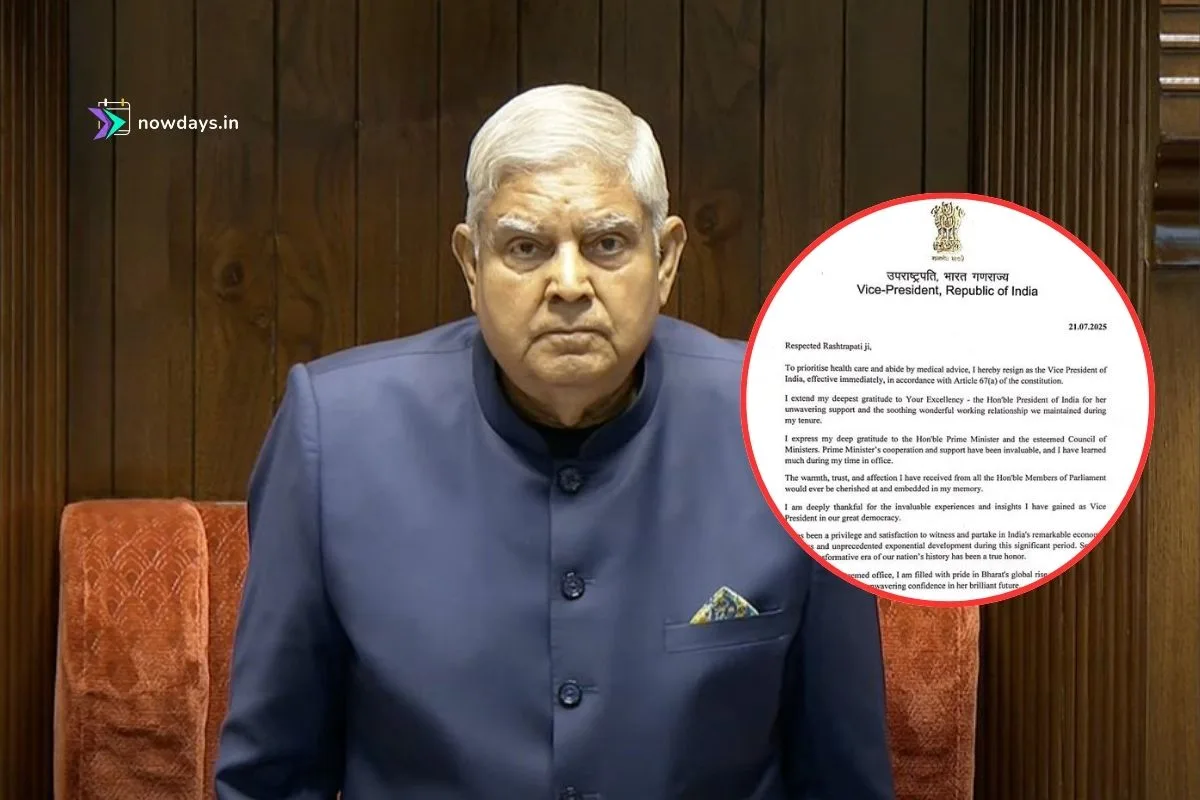The corridors of power in New Delhi were jolted on July 21, 2025, when Vice President Jagdeep Dhankhar submitted his resignation citing “health reasons.” However, beneath the surface of this ostensibly medical decision lies a complex web of political tensions, constitutional confrontations, and coalition pressures that may signal deeper cracks in the BJP’s once-unshakeable political fortress.

The Resignation That Caught Everyone Off Guard
In a letter addressed to President Droupadi Murmu, the 74-year-old Dhankhar invoked Article 67(a) of the Constitution to step down with immediate effect. “To prioritise health care and abide by medical advice, I hereby resign as the Vice President of India, effective immediately,” he wrote. The timing of this resignation—occurring just as the Monsoon Session of Parliament commenced—has raised eyebrows across the political spectrum.
— Vice-President of India (@VPIndia) July 21, 2025
While Dhankhar had been hospitalised at AIIMS Delhi in March 2025 for cardiac-related issues3, his recent public appearances and active participation in parliamentary proceedings had suggested recovery. Just days before his resignation, he had presided over the Rajya Sabha with apparent vigour, administering oaths to eight new members1. This apparent contradiction between his public health status and sudden resignation has fuelled speculation about underlying political motivations.
The Political Context: A Vice President Under Fire
Dhankhar’s tenure as Vice President and Rajya Sabha Chairman has been marked by unprecedented confrontations with the Opposition and controversial statements that many viewed as partisan4. His relationship with Opposition parties deteriorated progressively, culminating in December 2024 when the INDIA bloc submitted a no-confidence motion against him—the first such attempt in Indian parliamentary history4.
The Opposition’s grievances were manifold. They accused him of conducting Rajya Sabha proceedings in an “extremely partisan manner,” allowing treasury bench MPs to make “wildest charges” against Opposition leaders while silencing dissent. Congress leader Jairam Ramesh had stated that moving the no-confidence motion was a “painful decision” but necessary “in the interests of parliamentary democracy”.
Dhankhar’s controversial positions extended beyond parliamentary procedure. He had called the Supreme Court’s use of Article 142 a “nuclear missile against democratic forces”6, openly criticised judicial decisions, and made statements that appeared to align closely with the BJP’s political positions rather than maintaining the neutrality expected of his constitutional office.
The Mimicry Row and Caste Politics
Perhaps the most humiliating moment of Dhankhar’s tenure came in December 2023 when Trinamool Congress MP Kalyan Banerjee mimicked him during a protest, with Rahul Gandhi filming the incident. Dhankhar took this deeply personally, describing it as an insult to his “farmer background” and the “Jat community”. The incident sparked widespread condemnation from the BJP, which attempted to frame it as an attack on farmers and the Jat community.
However, the political calculus backfired when Jat organisations and farmer unions from Haryana distanced themselves from Dhankhar. They criticised his silence during the farmers’ protests against the now-repealed farm laws, when “750 farmers lost their lives”. This rejection by his own community dealt a significant blow to both Dhankhar’s personal standing and the BJP’s attempt to use caste politics in his defence.
Coalition Pressures and Modi’s Diminished Authority
The resignation comes at a particularly vulnerable moment for the Modi government. For the first time since 2014, the BJP lacks an absolute majority in the Lok Sabha, having won only 240 seats in the 2024 elections—32 short of the magic number. This has forced Modi into coalition politics, heavily dependent on allies like Nitish Kumar’s JDU and Chandrababu Naidu’s Telugu Desam Party.
Read more: More than 50% of billionaires in India are of Gujarati origin
Both these leaders have proven to be demanding partners. Kumar’s JDU has opposed key BJP initiatives, including the Uniform Civil Code and certain UGC regulations. Recent tensions within the NDA were evident when Bihar Deputy CM Vijay Sinha clashed with JDU minister Ashok Choudhary over alleged sidelining of BJP MLAs. Similarly, in Karnataka, the BJP-JDS alliance faces internal conflicts, with JDS chief HD Kumaraswamy feeling increasingly marginalised.
The Aam Aadmi Party’s recent exit from the INDIA bloc, citing Congress’s failure to maintain Opposition unity, further illustrates the fragility of political alliances in the current landscape. This environment of shifting loyalties and coalition pressures may have created an atmosphere where even constitutional office-holders feel compelled to take unprecedented steps.
The Unspoken Rebellion Theory
Political analysts are increasingly viewing Dhankhar’s resignation through the lens of a “silent protest” against the BJP’s handling of constitutional offices and democratic institutions. Throughout his tenure, Dhankhar had been a vocal defender of governors against Opposition criticism, recently supporting Kerala Governor Rajendra Arlekar despite widespread protests17. His statements suggested someone deeply invested in maintaining the dignity and independence of constitutional offices.
The timing of the resignation—coinciding with mounting criticism of the BJP’s treatment of federal institutions and growing questions about parliamentary democracy—may not be coincidental. Dhankhar’s letter, while courteous, notably emphasised his “pride in Bharat’s global rise” rather than the BJP’s specific achievements, a subtle but significant distinction.
Constitutional Crisis in the Making
Dhankhar’s departure creates an immediate constitutional vacuum. The Deputy Chairman of Rajya Sabha, Harivansh Narayan Singh, will temporarily assume the role of Acting Chairman. However, the process of electing a new Vice President within the constitutionally mandated 60 days presents fresh challenges for an already beleaguered coalition government.
The electoral college for the Vice President comprises all 788 MPs from both Houses of Parliament. With the opposition strengthened after the 2024 elections and the BJP’s dependence on coalition partners, the selection of Dhankhar’s successor will likely involve intense negotiations and potential compromises that could further expose the government’s vulnerabilities.
The Broader Pattern of Institutional Stress
Dhankhar’s resignation fits into a broader pattern of stress on democratic institutions under the current dispensation. From the resignations of Election Commissioners to conflicts between governors and state governments, constitutional offices have increasingly become battlegrounds for political confrontations.
The Vice President’s office, traditionally above partisan politics, had become deeply embroiled in political controversies under Dhankhar’s tenure. His frequent criticisms of the judiciary, partisan statements on political matters, and confrontational approach with the Opposition had arguably diminished the office’s constitutional dignity.
Health or Politics: Reading Between the Lines
While Dhankhar’s health concerns are genuine—he had been hospitalised for cardiac issues—the suddenness of the resignation and its timing suggest more complex motivations. The fact that he had recently presided over parliamentary proceedings and shown no immediate signs of incapacitation raises questions about whether health was the primary or merely the convenient reason for stepping down.
Political observers note that resignations citing health reasons have historically provided face-saving exits for politicians facing untenable positions. In Dhankhar’s case, the mounting Opposition pressure, the failed impeachment attempt, and his increasingly isolated position may have made his office unsustainable.
The Modi Government’s Response Challenge
The BJP’s response to Dhankhar’s resignation has been notably muted. Unlike previous occasions when the party had vigorously defended him, there has been little attempt to portray his departure as anything other than a health-related necessity. This restraint itself speaks volumes about the government’s recognition of the political sensitivities involved.
Prime Minister Modi’s brief acknowledgement of Dhankhar’s service, while respectful, lacked the usual hyperbolic praise reserved for party loyalists. The government now faces the delicate task of selecting a successor who can command respect across party lines while not alienating coalition partners who may have their own preferences.
Implications for Democracy and Federalism
Dhankhar’s resignation, whether voluntary or under pressure, sends a significant message about the current state of Indian democracy. It demonstrates that even constitutional office-holders are not immune to political pressures and that the traditional boundaries between partisan politics and constitutional duty have become increasingly blurred.
For federalism, the resignation removes a controversial figure who had often been at odds with Opposition-governed states during his tenure as West Bengal Governor and later as Vice President. His departure may provide an opportunity to reset relationships between constitutional offices and federal units, though much will depend on his successor’s approach.
Read more: Swachh Bharat Abhiyan: ₹12,000 Cr Spent, But Where’s the Clean India?
The Path Forward
As India grapples with the implications of this unprecedented resignation, several questions remain unanswered. Will the BJP’s diminished political capital make it difficult to install a partisan successor? Can the next Vice President restore the office’s traditional non-partisan character? And most importantly, does this resignation signal broader institutional reforms or merely a temporary respite in ongoing political battles?
The process of selecting Dhankhar’s successor will be closely watched as a test of the coalition government’s cohesion and the BJP’s ability to maintain control over constitutional appointments despite its reduced parliamentary strength.
A Resignation That Speaks Volumes
Jagdeep Dhankhar’s resignation as Vice President, ostensibly for health reasons, may well be remembered as a watershed moment in Indian constitutional history. Whether viewed as a silent protest against institutional pressures, a face-saving exit from an untenable position, or genuine health concerns, it highlights the complex dynamics between politics and constitutional offices in contemporary India.
The timing, circumstances, and broader political context suggest this was far from a routine medical resignation. Instead, it represents a significant crack in the BJP’s institutional dominance and raises fundamental questions about the balance between partisan loyalty and constitutional duty.
As India enters a new phase of coalition politics after a decade of single-party dominance, Dhankhar’s departure serves as a reminder that no position—however constitutionally protected—remains immune from the pressures of democratic politics. The challenge now lies in ensuring that his successor can restore both the dignity and the independence that the office of Vice President demands, while navigating the increasingly complex political landscape of modern India.
The resignation may indeed be the silent protest that political commentators are beginning to recognise—not just against individual political pressures, but against a broader erosion of the constitutional conventions that have long underpinned Indian democracy. In that sense, Dhankhar’s departure, regardless of its immediate motivations, serves as both a warning and an opportunity for democratic renewal.










2 thoughts on “A Silent Protest? Vice President Dhankhar’s Resignation Questions BJP’s Grip on Power”